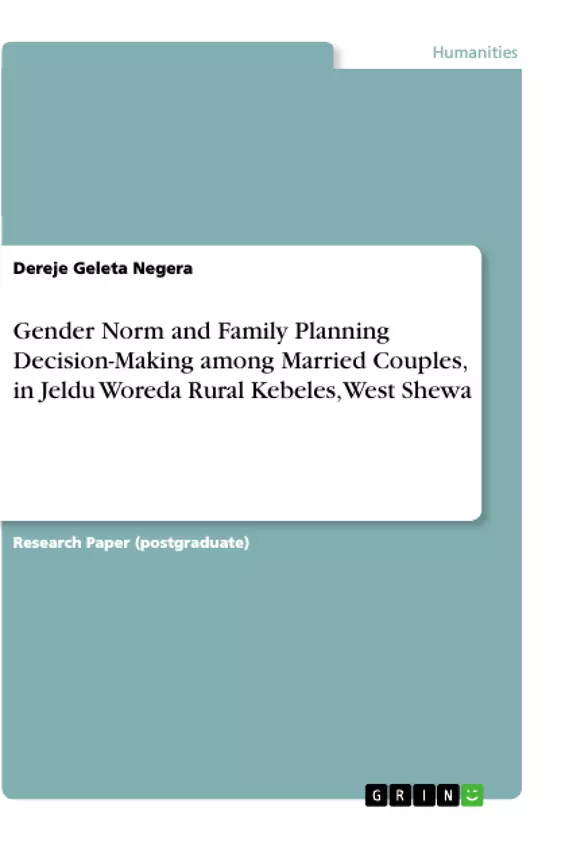Family planning is defined as the use of various methods of fertility control that will help individuals or couples to have the number of children they desire and at a planned time interval in order to ascertain the well-being of the children, parents and communities at large Different gender norms in the community were obstacles for family planning utilization in the community. Those gender norms directly or by complement with each other acts as the barriers of FP utilizations. Decision making power of men/husbands on family planning (needs for his consent by women/wives), seeing children as social prestige due to cultural beliefs, low status of women in community, undermining knowledge of women, limiting responsibility of women/wives to home, dominance of men/husbands on households, etc are affecting directly or by complement with each other the family planning decision making among Married couples.
Objective: To explore the influence of gender norms on family planning decision- making among married couples, in Jeldu Woreda rural Kebeles, west Shewa 2012/13.
Methods: A Qualitative study with grounded theory design was employed. Data collection was done using a semi-structured interview guide with open-ended questions. The methods employed were in-depth interview and focus group discussions.
Data analysis was begun with transcription. Transcripts were coded using Atlas.ti-7 Software using thematic analysis.
Recommendation: HEWs, woreda women’s and children’s affairs and family planning programmers needs to consider and design activities that have more holistic approach, including and integrating elements like men’s dominance on households, the low-status women in the community, cultural beliefs related with number of children, attitudes towards gender and proverbs/sayings related with gender.
BCC and IEC program targeting family planning at different levels of government FMOH, Regional health bureau and woreda health office should give consideration and attention for gender norms in the community.
Inhaltsverzeichnis (Table of Contents)
- Summary
- Acknowledgement
- Table of contents
- Abbreviations
- CHAPTER ONE
- 1. Background
- CHAPTER TWO
- 2. Literature review
- Theoretical approach to the study
- CHAPTER THREE
- Significance of the study
- CHAPTER FOUR
- RESEARCH QUESTION AND OBJECTIVE OF STUDY
- CHAPTER FIVE
- METHODS AND MATERIALS
- Chapter six
- Result
- ANNEX ONE
- ANNEX TWO
- ANNEX THREE
- ANNEX FOUR
- ANNEX FIVE
- ANNEX six
- ANNEX SEVEN
Zielsetzung und Themenschwerpunkte (Objectives and Key Themes)
This qualitative study aims to explore the influence of gender norms on family planning decision-making among married couples in Jeldu Woreda rural Kebeles, West Shewa during 2012/13. It investigates how these norms act as barriers to family planning utilization, considering various factors such as men's dominance in households, the low status of women in the community, and cultural beliefs about the number of children.
- Impact of gender norms on family planning decision-making
- Barriers to family planning utilization due to gender norms
- Cultural beliefs and their influence on family planning practices
- Power dynamics between men and women in family planning decisions
- The role of gender norms in shaping family planning attitudes and behaviors
Zusammenfassung der Kapitel (Chapter Summaries)
This section provides a summary of the key chapters of the qualitative study.
- Chapter One: This chapter lays out the background of the study, highlighting the importance of family planning and the influence of gender norms in the community.
- Chapter Two: This chapter reviews relevant literature and presents the theoretical framework that guides the study. It delves into existing research on family planning, gender norms, and decision-making in the context of marriage.
- Chapter Three: This chapter discusses the significance of the study, emphasizing the need to understand the impact of gender norms on family planning in the specific context of Jeldu Woreda.
- Chapter Four: This chapter outlines the research questions and objectives of the study, providing a clear roadmap for the investigation.
- Chapter Five: This chapter details the research methods employed in the study. It explains the qualitative approach using grounded theory design, data collection through semi-structured interviews and focus group discussions, and data analysis through thematic analysis.
- Chapter Six: This chapter presents the results of the study, highlighting the key findings regarding the influence of gender norms on family planning decisions.
Schlüsselwörter (Keywords)
The study focuses on gender norms, qualitative research, grounded theory, and decision-making in the context of family planning among married couples in rural communities.
- Arbeit zitieren
- Dereje Geleta Negera (Autor:in), 2013, Gender Norm and Family Planning Decision-Making among Married Couples, in Jeldu Woreda Rural Kebeles, West Shewa, München, GRIN Verlag, https://www.grin.com/document/520090



